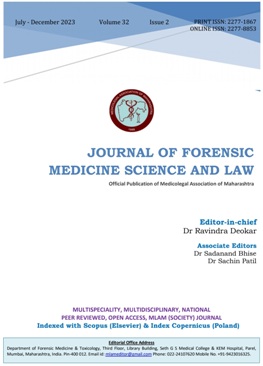Authors |
Anup Chandran, Ajith Antony, Sheryl Suares,Premila De Sousa Rocha, André Victor Fernandes |
Abstract |
Background: Sickle cell disease (SCD) is an autosomal recessive monogenic disorder that is common among individuals in many countries. In India, SCD is particularly prevalent in the western states. Sudden death in asymptomatic young adults with sickle cell trait, although uncommon, is usually due to infection and acute chest syndrome. Acute splenic sequestration crisis (ASSC) is an uncommon presentation among such patients. Clinically, cause of sudden deaths in SCD cases remain elusive and requires further research and reporting. Case presentation: In this report, we present the case of a previously asymptomatic 25-year-old male with ASSC. After complaining of fever and backache for three days, he was brought dead to the casualty of a tertiary care hospital. Apart from yellowish tinge of skin, on autopsy, we noted an enlarged spleen (weight=2010 grams) with chalky white calcified deposits on the surface. Histopathology of the spleen revealed sickled RBCs leading to ASSC and presence of Gamna Gandy Bodies. Bone marrow aspirate revealed erythroid hyperplasia. The final cause of death was opined to be splenic sequestration crisis. Conclusion: Sudden death due to sickle cell disease in an asymptomatic person warrants a stronger genetic vigilance. More focus on prenatal diagnosis of inheritable diseases is needed along with follow-up, guidance and counselling. In the present case, the decedent’s family was followed up post-mortem, counselled for undergoing genetic screening, and was finally referred to the Sickle Cell Society of India for further guidance.
|
















